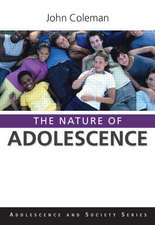Adolescents' Self-Discovery in Groups
Autor Theresa A. Thorkildsenen Limba Engleză Hardback – 9 aug 2016
Preț: 820.32 lei
Preț vechi: 1103.04 lei
-26% Nou
Puncte Express: 1230
Preț estimativ în valută:
156.97€ • 171.04$ • 132.27£
156.97€ • 171.04$ • 132.27£
Carte tipărită la comandă
Livrare economică 24 aprilie-08 mai
Preluare comenzi: 021 569.72.76
Specificații
ISBN-13: 9781138904552
ISBN-10: 1138904554
Pagini: 268
Ilustrații: 17
Dimensiuni: 152 x 229 x 20 mm
Greutate: 0.48 kg
Ediția:1
Editura: Taylor & Francis
Colecția Routledge
Locul publicării:Oxford, United Kingdom
ISBN-10: 1138904554
Pagini: 268
Ilustrații: 17
Dimensiuni: 152 x 229 x 20 mm
Greutate: 0.48 kg
Ediția:1
Editura: Taylor & Francis
Colecția Routledge
Locul publicării:Oxford, United Kingdom
Public țintă
General, Postgraduate, Professional, and UndergraduateCuprins
Preface
Acknowledgements
Introduction: Discovering the Self in Society
Part 1: Personal Discourse
Chapter 1: Caring for the Self
Chapter 2: Learning from Models
Chapter 3: Negotiating Rejection and Neglect
Part 2: Civic Discourse
Chapter 4: Choosing Causes
Chapter 5: Group Decision-Making
Chapter 6: Deciding When and How to Reject Outgroups
Part 3: Civil Discourse
Chapter 7: Intentions and Civil Discourse
Chapter 8: Schools as Institutions of the Civil Sphere
Chapter 9: Cultivating Relational Ties Between Youth and Society
Epilogue: Striving for an Aristotelian Balance
Acknowledgements
Introduction: Discovering the Self in Society
Part 1: Personal Discourse
Chapter 1: Caring for the Self
Chapter 2: Learning from Models
Chapter 3: Negotiating Rejection and Neglect
Part 2: Civic Discourse
Chapter 4: Choosing Causes
Chapter 5: Group Decision-Making
Chapter 6: Deciding When and How to Reject Outgroups
Part 3: Civil Discourse
Chapter 7: Intentions and Civil Discourse
Chapter 8: Schools as Institutions of the Civil Sphere
Chapter 9: Cultivating Relational Ties Between Youth and Society
Epilogue: Striving for an Aristotelian Balance
Recenzii
"In this important, creative, and provocative book, Professor Thorkildsen extends substantially the boundaries of the developmental science of adolescence. She uses cutting-edge relational developmental systems concepts and innovative methods to illuminate the fundamental significance of mutually influential relations between individuals and their social worlds in shaping the emergence of adolescents’ conceptions of self and of their roles in group and community life. Adolescents’ Self-Discovery in Groups is a singularly invaluable addition to the literature of youth development, one that provides a profound understanding of the process through which youth become active contributors to their own development and to civil society."
--Richard M. Lerner, Bergstrom Chair in Applied Developmental Science and Director, Institute for Applied Research in Youth Development, Tufts University, USA
"Adolescents’ Self-Discovery in Groups is the product of professional experience and expertise in adolescent thinking accrued over three decades of research work with adolescents. This is a major contribution to existing literature on adolescent identity development in a globalized, technology-driven world. The book seamlessly integrates psychological literature on the role of groups in adolescents’ development with philosophical discourses on civic and civil education in democratic societies and sociological discussions on the role of institutions such as schools and community organizations to understand how adolescents construe their social worlds."
--Revathy Kumar, Professor, Educational Psychology, Judith Herb College of Education, University of Toledo, USA
--Richard M. Lerner, Bergstrom Chair in Applied Developmental Science and Director, Institute for Applied Research in Youth Development, Tufts University, USA
"Adolescents’ Self-Discovery in Groups is the product of professional experience and expertise in adolescent thinking accrued over three decades of research work with adolescents. This is a major contribution to existing literature on adolescent identity development in a globalized, technology-driven world. The book seamlessly integrates psychological literature on the role of groups in adolescents’ development with philosophical discourses on civic and civil education in democratic societies and sociological discussions on the role of institutions such as schools and community organizations to understand how adolescents construe their social worlds."
--Revathy Kumar, Professor, Educational Psychology, Judith Herb College of Education, University of Toledo, USA
Descriere
Drawing on numerous case studies, Adolescents’ Self-Discovery in Groups seeks to explain the role that schools play as sites for adolescent group exploration, so that teachers and researchers can be better prepared to influence those dynamics in ways that promote civil and civic society, and encourage learning, positive identity formation, and a sense of justice.















